Eulogy
We all have a purpose in life; it is the reason why we exist in the first place. But once we’ve completed our mission here on Earth, unfortunately our time will be up. This is the reason why we lose people so suddenly, and even at the most random circumstances at that. But amidst the feeling of grief and remorse, we must learn to turn our thoughts and emotions into a celebration of the life lived and the legacy made.
Modern Eulogy Funeral Tri-Fold Brochure Template
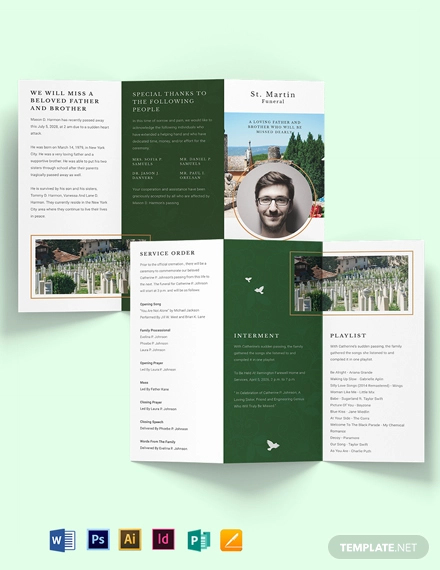
Modern Eulogy Funeral Bi-Fold Brochure Template
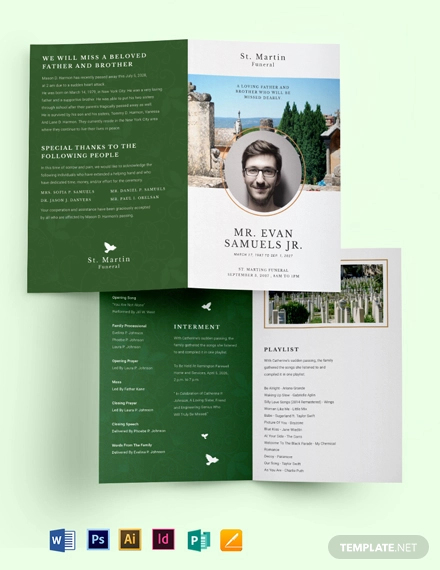
Minimalistic Eulogy Funeral Tri-Fold Brochure Template
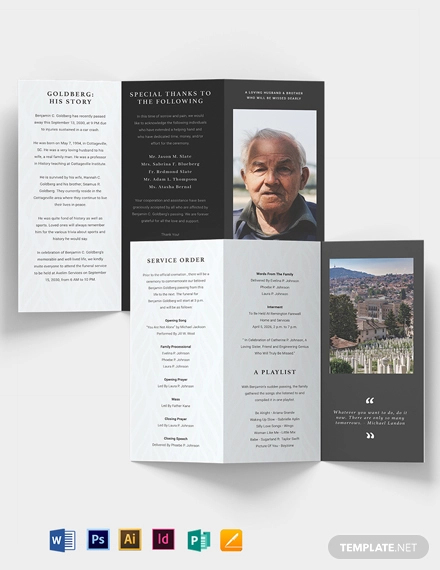
Minimalistic Eulogy Funeral Bi-Fold Brochure Template
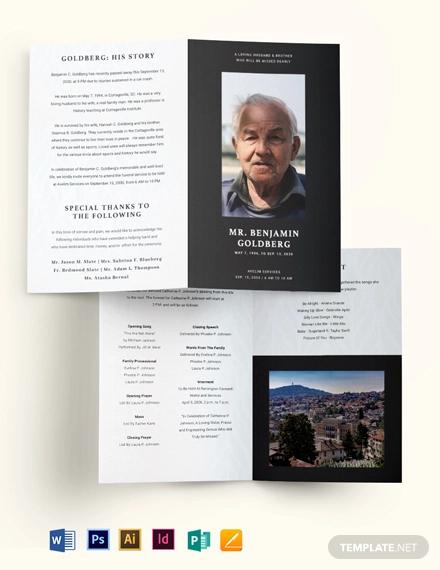
Funerals always appear dark and gloomy from the outside. But little do people realize how this is a time for everyone to come together to commemorate the beauty of life. A eulogy, also known as a funeral speech, is made to pay tribute to those who have passed. It serves as a reminder of all the memories shared and one’s impact in the life of every individual attending the funeral.
Military Eulogy Funeral Bi-Fold Brochure Template
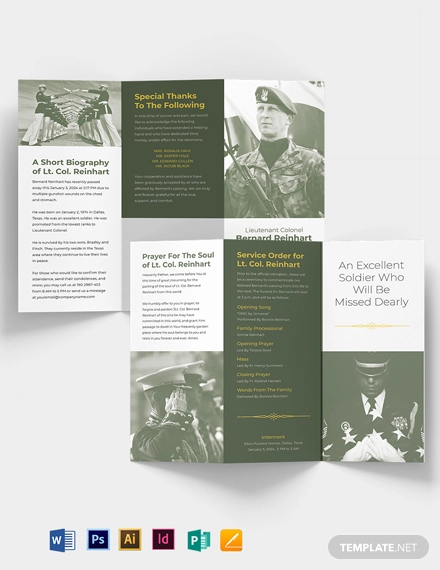
Military Eulogy Funeral Bi-Fold Brochure Template
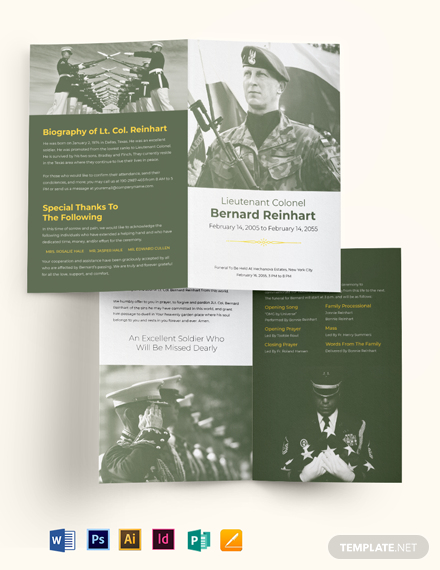
Celebration of life Eulogy Funeral Tri-Fold Brochure Template
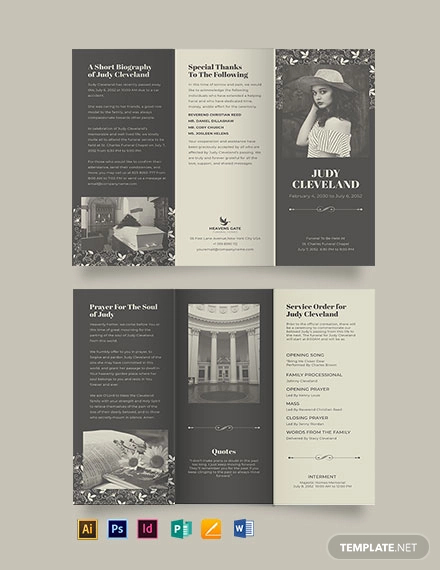
Celebration of Life Eulogy Funeral Bi-Fold Brochure Template
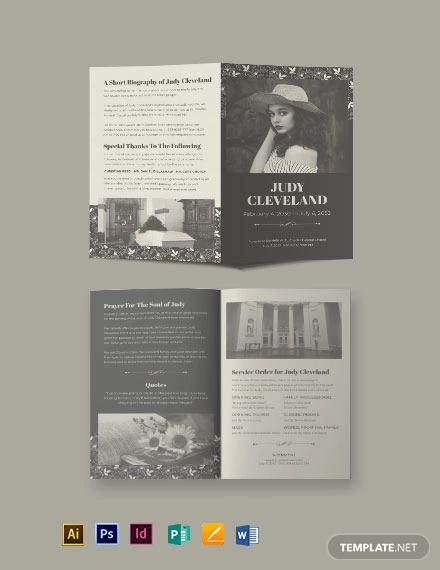
Guidelines for Writing the Perfect Eulogy

Considering the overwhelming flow of emotions you must be feeling at the moment, putting your thoughts together to craft a good eulogy must be the last thing on your mind. But channeling your deepest emotions into words is a good form of therapy, as it allows you to come at peace with your inner thoughts. While only you can decide how your eulogy goes, the following tips will help you effortlessly compose a touching and meaningful speech to your departed loved one:
1. Keep it brief.
Not even a million words would be enough to express our love and gratitude towards our loved ones. But sometimes, speaking for too long in front of an audience will make listeners feel bored and awkward about the whole situation. Constant rambling can eventually cause listeners to divert their attention to something more interesting. Avoid making a list of events and memories that aren’t as momentous as the others by focusing on the quality of your content rather the quantity. While there isn’t an exact time limit for you to follow, a eulogy not more than five minutes long would be enough to get your point across. You may also see Writing Templates.
2. Make it personal and relatable.
Personal memories make good quality content. It’s the unique experiences that you and a loved one have shared that appeals to listeners the most. Maybe there are words you’ve been meaning to say but never really had the chance to say them aloud. Take this as an opportunity to convey your thoughts and emotions instead of keeping them to yourself. Again, refrain from reciting a long, dull list of facts as if you are reading an encyclopedia.
3. Be honest.
A heartfelt eulogy will always be appreciated. It’s not about being overly sentimental and romantic with your words, but it’s about delivering a sincere message that people will remember. Even then, refrain from bringing up any issues or problems that could stir up a negative response in the room. Forget any differences you had with your loved one and focus on writing about his or her positive traits rather than negative ones. Although you can share about old habits and imperfections, keep it on a lighter tone by incorporating it in a joke. Listeners aren’t there to judge your eulogy, but you also need to make sure you don’t leave a negative impression on them by the end of your speech. You may also see Prepositional Sentences.
4. Tell a story.
Storytelling is always the most interesting part of a eulogy. It’s like reading through the best parts of your favorite book. There may not be enough time to go through every single memory from the very first day you met with that person, rather focus on your best memories instead. It doesn’t need to be about a life-changing event, just as long as listeners can find it meaningful so both you and the listeners can reminisce and treasure the moment. If you’re having trouble deciding on which story to share, choose a memory which resembles an experience you had with that person or a special skill that person possesses that you fondly remember.
5. Build a connection with your audience.
Not everyone is a fan of public speaking. The mere idea of standing in front of a crowd already gets the individual not adept in public speaking nervous and experiencing cold sweats. If you’re that type of person and you were asked to deliver a eulogy, don’t think about it as a speech. The key to making a good eulogy is to keep it conversational. Speaking in a tone that you would normally have with a friend or family member is a great way to calm your nerves. Also, ignore the pressure which sometimes rattles individuals when a microphone is presented in front of their faces. You are not being judged when you speak your eulogy.
Knowing this, you could always say the names of people in the audience to make it more conversational. Unlike most speech examples, you don’t need to worry about pausing for a moment to gain composure when saying something emotional. The copy of your eulogy would simply serve as your guide throughout the whole experience.
6. Keep a positive tone.
If you can’t help but share some of the most unfortunate events of a person’s life in front of a crowd, make sure you end it on a positive note. There’s always a silver lining in even the toughest situations and make sure you create an analogy on how that negative experience was the root of something more meaningful. Try to focus on the good things the deceased got to experience in his or her lifetime. It’s not about the number of years the person has lived, but all the experiences that person has accumulated in all those years.
7. Write it down on paper.
Start with a draft before you make the final copy of your eulogy. You could either have a printed copy or an outline written in an index card. Whatever the case may be, having a copy to refer to will allow you to have a smooth flow when reading the eulogy. The font style and size must remain visible enough from a reading distance as well.
8. Practice and edit.
While it won’t be necessary to memorize every single word written in the eulogy copy, it’s always best to be familiar with its content. Practicing your eulogy with a loud and clear voice will also help you identify words or objective statements that seem out of place or inappropriate for the occasion. Once this is done, you can then make the necessary adjustments.

Being asked to deliver a eulogy for a loved one is always a huge honor. This is your opportunity to pay tribute to a friend or relative in the most heartwarming way possible. After all, it’s not about how they left, but it’s about the time they’ve spent with every person in the room that matters the most.


